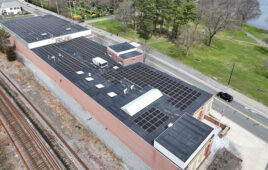Illinois Assistant Majority Leader Will Davis (D-East Hazel Crest) was joined by fellow members of the legislative Black Caucus and cosponsors of the Path to 100 Act as he announced a new diversity and equity plan for renewable energy and called to fix the state’s renewable energy funding crisis during the fall veto session.
Davis was joined by Deputy Majority Leader Representative Jehan Gordon-Booth (D-Peoria), Representative Kambium Buckner (D-Chicago), Representative Kelly Cassidy (D-Chicago), Representative LaToya Greenwood (D-East St. Louis), Representative Joyce Mason (D-Gurnee), Representative Yoni Pizer (D-Chicago), Representative Lamont Robinson Jr. (D-Chicago), and Representative Justin Slaughter (D-Chicago) as well as representatives of Illinois clean energy job training programs and businesses.
Illinois has already lost nearly 3,500 solar jobs due to lack of funding for the state’s renewable energy program. Over 1,000 more jobs are expected to disappear by the end of the year without legislative action. Governor Pritzker’s energy and climate principles, released in August, called for Illinois to become a renewable energy leader and acknowledged that “Illinois’ renewable energy industry is in desperate need of support.” The Governor has convened working groups to shape comprehensive energy reform legislation, and discussions are ongoing.
Davis and his colleagues argue that the Path to 100 Act (HB2966/SB1781), which was designed to fix the current clean energy crisis, must pass this fall as a step toward broader reform.
“If we want comprehensive energy reform, we need to save our renewable sector before it’s too late,” said Rep. Davis. “Illinois cannot afford delays in Springfield that will destroy thousands more renewable energy jobs. The Path to 100 Act, combined with our diversity principles, can pass now and move us closer to the Governor’s energy and climate goals.”
The Diversity and Equity principles would expand existing structures to make sure that renewable energy is more inclusive and accessible for the low-income consumers, workers and minority-owned businesses. The plan would:
- Leverage DCEO’s existing infrastructure to coordinate workforce development and business development initiatives for the renewable industry across Illinois
- Create a Diversity and Inclusion plan that requires every business participating in the RPS to meet mandated hiring or contractor goals
- Expand access for low income customers to take advantage of community solar and the Solar for All Program and prevent these programs from being impacted by the rate cap on the RPS budget
“Illinois’ renewable energy industry supports these principles. We are committed to making our workforce as diverse as our state and ensuring that all families can take advantage of clean energy savings,” said Nakhia Morrissette, central region director for the Solar Energy Industries Association. “But these advances won’t happen if our industry goes out of business. Fixing Illinois’ clean energy funding crisis is necessary to sustain and expand renewables in Illinois and continue to make diversity a cornerstone of our next phase of growth.”
News item from Path to 100






Tell Us What You Think!